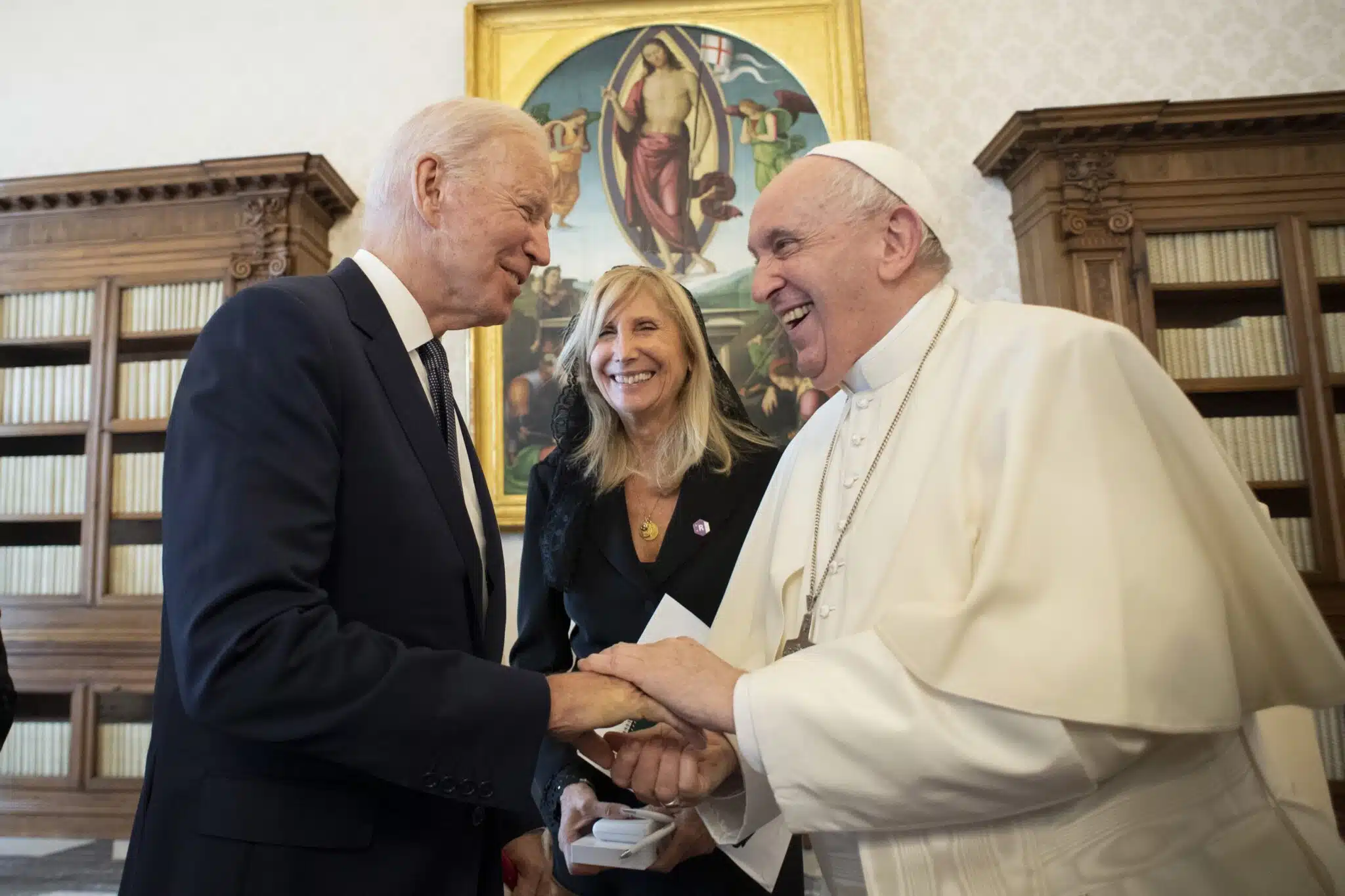Declare a fast with abstinence, add a little almsgiving and don’t forget prayer. But wait! “Do you call this a fast, a day acceptable to the LORD? ” God asks in Isaiah 58:5b.
You mean all those years of salmon patties, fish sticks and scrambled eggs for supper don’t count? What’s wrong with Lent as 40 days of endurance without any real change in our hearts? How can we change course and find a deeper faith this Lent?
We Catholics and other Christians have long put on spiritual ashes to renew our faith and turn back to God wholeheartedly. Yet, our traditional pillars of Lenten practice need to be regularly revisited and tweaked. We may need to leave our comfort zone and make them a genuine spiritual workout. For Lent to really matter, we must take a hard look at the state of our spirits. Then we can respond in a way that establishes deeper connections with God, our families and even our selves. Lent is not enduring a virtual board game, that is, arriving at Easter with our “giveup ” list intact. Lent means moving closer to the holy way.
Statements such as “I always give up candy for Lent ” or “I never miss daily Mass during Lent ” are a great beginning. The same practices that we have used for 20 years, however, may no longer serve their original purpose. Comfortable with the routine, we may fashion a fairly cozy desert trip. Don’t we need a Lent with more personal bite?
God invites us to look at all our relationships with a willingness to make changes. Giving up things that mean little to us, such as candy, soda, etc., are respectable, safe gestures that cannot impact the state of our souls. However, when we look critically at how little time we spend in prayer, what we worship in the secular world or how we spend our money, now we are talking!
Control is the basic issue. If we allow God into our lives more, that might challenge a spiritual closet arranged too neatly. We may even discover a painful skeleton that we have successfully ignored.
Deep within that closet, God is ready to help us sort out years of fears, assumptions, refusals to forgive and everything that keeps us from his real kingdom. This is not necessarily our version of what life with God is all about. So, how do we begin to clean our spiritual closets so that they reflect God’s version of “neat and tidy “?
A word of warning: Before we enter our spiritual closets, we must allow the Holy Spirit to do the sorting. As painful as it may be, the Holy Spirit’s housecleaning means that everything must come out. Then the Spiritus Santus scrubs it down with a strong solution of honesty. God’s hands are very thorough. Be ready and willing to be stripped.
Who’s Talking? Who’s Listening?
The bones of the Lenten journey are prayer. They certainly must go back into our closets. Just how much time do we devote to prayer? For the most part, we are good for Sunday Mass and a little daily prayer. Perhaps we pray on the way to work or say goodnight to God before we sleep. However, our loving God wants much more than this. Although God is jealous and wants all we can give, we acknowledge his constant presence with an occasional nod.
During Lent, we are invited to take our daily lives apart, seeking a new time and place to talk with God. Since last Lent, the secular world has filled our days with work, sports, emails and Twitter. God asks us to put aside these distractions and start listening to him rather than the latest news on the Internet. Being with God is amazing. He says, “Be still and confess that I am God ” (Ps 46:11).
Listening to God is more important than filling God in. As Lent begins, we need to find a time and a place simply to sit with God. Talking to God is great, but God knows what is in our hearts before we speak. We should seek to be aware of what is in God’s heart. Then, the conversation is mutual.
A dynamic pastor in a parish in the Northwest recounts his desire to just find a few moments each day to leave the demands of parish ministry and be with God. He informed his secretary that every day he had an appointment with Mr. Bench. It was a non-negotiable time slot. For one hour, he would be unavailable. The secretary never questioned him.
After a few months, however, she wondered what needy person required so much of the pastor’s undivided attention. So one day she followed him. From a safe distance, she discovered that her weary boss went to a city park, sat on a park bench, opened his Bible and bowed his head. He came to meet God in prayer. For one blessed hour, God had his undivided attention. That pastor’s example is a great place to start your Lenten prayer.
While we need not disregard our regular styles of prayer during Lent, perhaps we can look for new opportunities: For example, rather than lunch with co-workers, could you bring lunch and eat alone on a park bench? Then, after you have eaten, imagine that the Divine One is sitting next to you.
Don’t pressure yourself with talk; merely sit with God and feel his presence, like two old friends. We can give up an hour of nightly TV or Facebook time and sit still or read a line from the day’s Gospel, one that can connect us with the mind of God. A relationship with God requires more than an hour on Sunday morning. We need to start talking and listening to God with forethought and determination. During Lent we can change our schedules and make an appointment with God.
Other forms of prayer are also a great help. While most of us make it to church on Sunday, it is wonderful to go to church when we are not obliged. The parish is sure to offer an array of opportunities for prayer, including the parish Way of the Cross, Friday eucharistic adoration and reconciliation services. We don’t have to do it all simply choose one of these prayer activities.
We need to find a way that fits our world. The Shepherd of Souls will lead us along right paths. Finding our personal path of prayer is well within the Shepherd’s skill set if only we yield to his directions.
What Do We Truly Need?
Most Catholics tend to bundle fasting and abstinence, believing that they mean doing without for reasons that are beyond us. The simplest way to understand the difference between the two is to see fasting as giving something to God for the sake of love and abstinence as denying ourselves something for the love of God.
The key word in these explanations is the word “love. ” Fasting and abstaining are love tokens offered to God. When we are madly in love with the woman or man of our dreams, we automatically want to give that person tokens of our love. Red roses, candlelight suppers, love notes, etc., are visible signs of an unseen love, giving physical form to our love.
When we fast and abstain, we give God a love token. The action of giving up something shouts our love to the heavens; the Beloved is delighted. Fasting and abstaining are difficult for most Catholics because loving God is a real challenge. We struggle because the fast or abstinence forces us to deal with the fact that we might love the thing we are fasting from more than we love God. (Remember, I said the Holy Spirit would be scrubbing us with truth serum!)
I was once teaching a preparation class for first reconciliation, explaining to parents and children the commandment “You shall not have other gods besides me ” (Dt 5:7). I told the group that whatever you think of when you have nothing else on your mind, that is your god. A little boy sitting next to his dad jumped up and shouted, “You mean my daddy’s god is golf! ” Dad was thoroughly embarrassed, but the truth hit home. He was teaching his son that it was all right to miss Sunday Mass if you had a tee time.
Fasting can be “giving up ” or “doing something more. ” Abstinence means doing without something. We abstain from meat on Fridays during Lent while we might fast from noise and keep silent for an hour. This is a subtle difference, yet the emphasis is quite different.
Fasting is positive energy based on changing what we do in a graced way. Abstinence is a decision to remove from our lives something that may hinder our love for God. For instance, the dad in the reconciliation class might want to abstain from golf during Lent.
The most effective Lenten fasting is one that is directed to a change in our lives. A good fast is more than not eating chocolate. The fast has more power if it leads us to a more honest and holy life. If Lent is about renewing and reforming our lives, then we need to link the fast to a change in habits. While giving up candy is a great start, it is far more impressive to change our lifestyle habits to eat healthier snacks. The goal is to lead us to growth and renewal.
Becoming Christ’s Hands and Heart
This is the third and most life-changing pillar of Lent. Whether we call it almsgiving or acts of service, we are describing a letting go of self-concern and giving our time, talent and resources to others.
Our spiritual closets are starting to look pretty good with all the boxes of fasting, abstinence and prayer on the top shelf. But coats of service need to be hung up. A few such coats are well-worn: the threadbare jacket we wear to the soup kitchen, the nice wool coat we wear for church ministry. God puts these coats back in the closet with no problem.
Without hesitation, the Holy Spirit takes some other coats to the trash. Now is the time for us to look honestly at how we spend our time. Lent is a good time to recognize what consumes most of our time and energy. We can get a full report by looking at our daybook, Blackberry, etc.
Lent is the acceptable time to devote less time to our jobs; anything over 60 hours a week is harmful. During Lent, we can say no to activities that corrode our spirits. On the First Sunday of Lent, we should make a list of which coats we no longer need. Then, make the calls and resign from any committees, groups or clubs, that are no longer worthwhile for us.
There are many ways to serve others and give to the poor. I recommend simply choosing one new Lenten project.
Lent’s days can be a holy and yet exciting time. They allow us to get things back to where they belong. Savoring Lent’s 40 days is a good thing. Rather than seeing Lent as drudgery, open your soul’s inner door. As we face the mess within our spiritual closets, we may discover that our housecleaning with God this Lent has brought a peace that surpasses our wildest dreams.
6 Ways to Promote Selfless Giving
1) Volunteer at a nursing home. Take children with you and perhaps even the family pet. Many elderly people are lonely and love company.
2) Make a list of 40 people who would love to hear the sound of your voice. Call them, one person a day, and tell them that you love them.
3) Watch someone’s children so that he or she can have a break.
4) Give 15 percent of your weekly salary to a family that has no income.
5) Gather a group of friends and volunteer to do house repairs for single parents, elderly people or anyone in your parish who needs help.
6) Each day of Lent, practice a random act of compassion: Help someone to his or her car with groceries, give up lunch and give the money to a needy friend, clean up a mess that you did not make.
Service turns us into the hands and heart of Jesus Christ. By turning from self and serving others, we are becoming Christ’s living, breathing presence. This is what St. Augustine meant when he preached, “Become what you have eaten ” (the Eucharist).
My Favorite Lenten Fasts
Proclaim an electronic fast on weekends. That means no iPad, iPod, Blackberry or computer until Monday morning. Then spend the resulting free time visiting people you love and spending quality time with your spouse and children.
Stay out of unnecessary stores during Lent. Anything beyond the grocery store, pharmacy, etc., is off-limits. Instead of adding more stuff during Lent, give away or throw away three things each day before Easter.
Go green in a big way. Every day perform a Lenten “random act of kindness for the earth. ” Keep a journal of your green project work, and after Easter do these acts regularly.
Fast from media during Lent. Stop watching TV or Internet news or even listening to the radio. For 40 days, turn your thoughts to God. Choose to spend your time reading a book or magazine that feeds your soul.
Walk everywhere you can. Limit gas usage to a certain amount and make it last all week. Each day, walk with God. Simply imagine that you and Jesus Christ are running or walking side by side. Talk to him and listen to him.
These are only a few suggestions that can impact your life. We need to look at our lives objectively, honestly recognizing our weaknesses. Design a fast that responds to those weaknesses. And, most of all, don’t do something that comes easily. Your Lenten workout should hurt a little. We will know when we are changing for good when it takes effort to do the deed.








